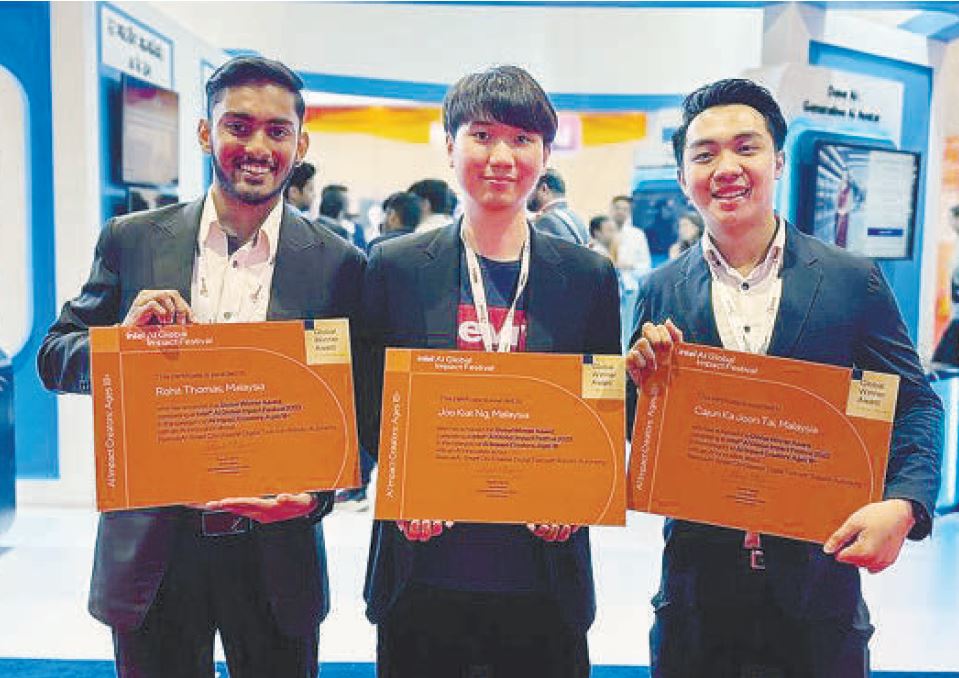By: RAVEEN AINGARAN
The Sun Daily, 12th February 2024
Three students from the Asia Pacific University of Technology and Innovation, emerged winners of the Intel AI Global Impact Festival 2023, beating 125 other teams, which competed from Sept 13 to 20.

Rohit Thomas, 25, Ng Joo Kiat and Cajun Tai Ka Joon, both 23, also showcased their project at the Global Partnership on Artificial Intelligence Summit 2023 held in New Delhi, India from Dec 12 to 14.
Their project titled “RescueAI: Smart city disaster digital twin with robotic autonomy”, showcased exceptional innovation and demonstrated the immense potential of artificial intelligence (AI) in addressing real-world challenges.
The Intel AI Global Impact Festival is an annual event focused on digital readiness, bringing together next-generation technologists, academia, ecosystem partners, and government collaborators to showcase the innovation and impact of AI.
Thomas, who has a bachelor’s degree in electrical and electronics engineering, played a pivotal role in the winning project.
He said their project’s advanced disaster management system addresses plastic waste reduction and safeguards marine and human life.
“Utilising state-of-the-art technologies such as digital twin, a language processing tool improved for better speech recognition, AI-enabled drones, and a sensor for object detection, our RescueAI project allows emergency responders to quickly ascertain available resources for effective disaster management and flood prevention.”
Thomas said his team harnessed cutting-edge technologies and methodologies to elevate the capabilities of the digital twin and robotic autonomy in disaster response scenarios. One innovation involved integrating natural language processing (NLP) and machine vision into a public-facing mobile app.
“This allowed the system to automatically process and analyse reports submitted by users to discern if the accompanying images depicted actual disasters,” he added.
“The AI and NLP capabilities eliminated the need for human intervention in the verification process. Once verified, the information is seamlessly fed into the digital twin and instantly updates the 3D map.
“In situations like disaster response, this automated workflow significantly speeds up the rescue process, emphasising the critical importance of every second in saving lives.”
During the competition, Thomas said the digital twin and robotic autonomy were put to the test in realistic disaster scenarios.
A mobile app facilitated image uploads, with backend AI inference connecting to the digital twin to display GPS locations. Real-time integration of rain effects in the digital twin relied on data from a flood weather station.
Additionally, he said the system’s response time in natural language understanding was evaluated for commanding drones, while visual-linguistic-motor response was tested to recommend ideas based on uploaded images, specifically in flood and fire situations.
A primary challenge the team encountered during the competition was achieving full autonomy for the drone, positioning it as the initial responder in the system.
“To address this, we initially simulated the entire flight path in software, ensuring precision and reliability, before deploying the coordinates to guide drones in the real world.
“This approach allowed us to meticulously plan and test the autonomous capabilities, mitigating potential risks and ensuring the effective and responsive role of the drone as a first responder in the system,” he said.
“The strong hardware and support from Intel empowered us to harness advanced computing capabilities, facilitating the creation of an efficient and innovative solution for the competition.”
(This is a news report by the Sun Daily, 12th February 2024, you can also read it HERE)
News & Happening
Download e-Brochures
Intake Calendar
Want to know more ?
Let’s Connect